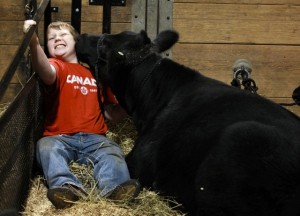As the number of sick with E. coli O157 linked to Cleveland County Fair rose to 106, North Carolina Health News details how the investigation started. Excerpts below:
When David Sweat received a phone call late one Monday afternoon that a Gaston County child was hospitalized with an E. coli infection, he knew he’d miss dinner that night, and for many nights to come.
It was Oct. 8. Sweat, an epidemiologist with the Communicable Disease Branch of the state Division of Public Health, knew a county fair had just wrapped up in the Gaston  County vicinity. Sweat also knew that only a small percentage of people exposed to E. coli end up with kidney failure like the child in the hospital.
County vicinity. Sweat also knew that only a small percentage of people exposed to E. coli end up with kidney failure like the child in the hospital.
“We knew immediately this was likely to be a bigger outbreak,” Sweat said.
Sweat stayed late that night, making phone calls to learn more of what was happening and to consult with doctors and lab technicians where the child was hospitalized.
The next morning, two more calls came in. Sweat’s colleagues dropped what they were doing and started looking for more cases. They found four that day, all hospitalized in Charlotte.
By the end of the day Wednesday, Oct 10, the folks in the Communicable Disease Branch had ruled out other possibilities: The source was the Cleveland County Fair.
One of the epidemiologists, Zack Moore, sent out a blast communication to doctors, clinics and hospitals in surrounding counties – including neighboring South Carolina counties – alerting them to look for patients with symptoms characteristic of E. coli infection and who had some connection to the fair.
Two people were dispatched to the fairgrounds, where the exhibits and animals had been packed up days earlier. They collected swabs to confirm the relationship between the E. coli in stool samples and the bacteria on the ground.
“We were crawling around, collecting dirt and poop with disposable spoons,” said Carl Williams, a public-health veterinarian who collected more than 40 samples into sterile cups that came back to the state lab. There technicians compared bacteria from the soil samples with that from patients.
The bacteria persists. After the state fair E. coli outbreak in 2004, Foust’s team found the bacteria in the soil five months later. Aedin’s Law, passed in the wake of that outbreak, insures that the soil under animal exhibits where an E. coli outbreak takes place remains unused for six months.
 officials said. Five have been hospitalized.
officials said. Five have been hospitalized.
